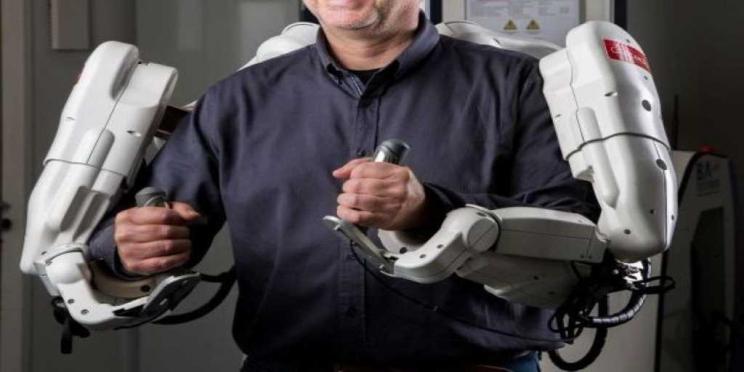Interreg funds robotic technology for stroke rehabilitation
20/01/2021

Computing experts will develop the first robotic exoskeleton to help stroke patients, thanks to €3.3m funding from Interreg France (Channel) England.
The project titled AiBle is led by the University of Portsmouth, working in collaboration with eight other partner organisations across academia and industry in France and England.
Drawing on cutting-edge technology in artificial intelligence, virtual reality, cloud computing and exoskeleton control, they will develop the first robotic exoskeleton to help stroke patients regain strength in their upper limbs, which can be controlled remotely.
Dr Zhaojie Ju, Principle Investigator of the project, University of Portsmouth, said: “This is an exciting project, which will help thousands of people to regain limb function and movement.
“Our novel rehabilitation protocol combined with the updated exoskeleton robot will be designed with improved functionality which will reduce the time of each treatment and allow for simultaneous and remote multiple treatments by therapists. There is no other product on the market like this at the moment.”
A stroke is a serious life-threatening condition that happens when the blood supply to part of the brain is cut off. Each year, 140 000 people suffer from strokes in France and 100 000 people in the UK. Rehabilitation helps stroke patients make the best recovery possible and re-learn skills for everyday life.
An exoskeleton is an external frame that can be worn to support the body, giving limbs extra movement, strength and endurance. This new generation of exoskeleton robot will help rehabilitate nearly 200,000 stroke patients.
Dr Ju and his colleagues Dr Dalin Zhou and Professor Honghai Liu will also develop wearable sensing and interpreting devices to better recognise the motion intention of patients during the rehabilitation process. This wearable technology - with embedded algorithms for biological signal analysis - will be developed to function independently and support the exoskeleton control.
The advanced functionality of this exoskeleton robot will enable remote and active rehabilitation, so patients can exercise by themselves as well as with a therapist controlling movement from a remote location.
Carolyn Reid, Programme Manager, Interreg France (Channel) England, said: “AiBle is a perfect example of projects we’re funding to spur the development of innovative products.
“This project combines excellence in research and design to develop a product that could transform the lives of stroke patients, helping them to more rapidly regain their independence and return to everyday activities.”
The project has a total budget of €4.8m, of which €3.3m is funded by the European Regional Development Fund via the Interreg France (Channel) England Programme.
More information available in the Project Summary.
